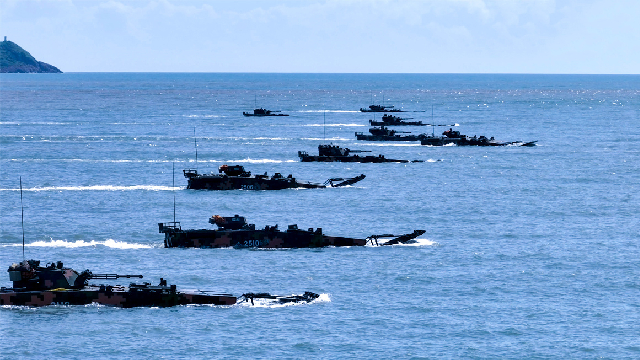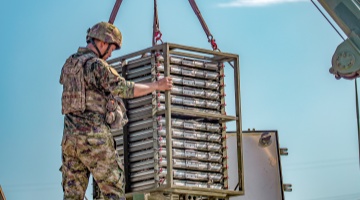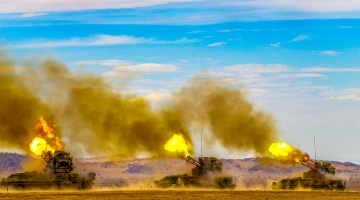By Zhang Yuanyong and Chen Yue
The ROK Ministry of Environment on June 21 officially approved the environmental impact assessment (EIA) report on the US's Terminal High Altitude Area Defense (THAAD) system at the US military base in Seongju county submitted by ROK Defense Ministry in May. This means that since THAAD's temporary deployment in the country in 2017, all the administrative procedures needed for base construction have now been completed and construction work will kick off soon on a full scale.
As an important component of America's current missile defense system, THAAD can intercept ballistic missiles at altitudes of 40-150 km and ranges of up to 200 km, boasting a stronger intercepting ability and wider defense radius than the Patriot missile defense system.
In 2016, the US and the ROK agreed to deploy THAAD in the latter on the grounds of countering nuclear missile threats from the DPRK, and six launching vehicles were stationed the next year. Due to continuous protests within the country and strong objections from surrounding countries, the Moon Jae-in administration halted in November 2017 the work on bringing the THAAD base to normal operation.
The incumbent Yoon Suk-yeol administration has mentioned THAAD multiple times since 2022. When running for office, he said he would continue to place the THAAD system in the country in light of its actual national security needs, and re-activated the THAAD base normalization process that has been on hold for nearly five years right after he took office.
In August 2022, ROK set in motion the EIA procedures for the THAAD base; in September, it pledged to allocate another 400,000 m² land for the base; in December, it said all procedures, including the EIA, provision of additional land, and equipment transportation, would be completed in three months; in February this year, the draft EIA report came out; on March 24, the ROK and American troops had the first deployment training of THAAD "remote" launcher, marking the system's normal combat-readiness and operation. The latest approval of the EIA report officially kicked off the base construction and the THAAD system will shift from temporary deployment to normal combat status.
The Yoon Suk-yeol administration accelerates the normal operation of THAAD base for several reasons.
First, it wishes to consolidate the alliance with the US. Seoul sees US-ROK alliance as the pillar of its national security and always puts Washington at the core of its diplomatic strategy. After Yoon Suk-yeol took power, he made strengthening bilateral alliance the focus of its diplomatic policy. As this year marks the 70th anniversary of their alliance, both countries have vowed to upgrade and transform their relationship at the new historical starting point, underscored by a series of activities including joint military exercises, meeting between top leaders, and release of statements. As an outcome of the heads-of-state summit, pushing the normal operation of THAAD base will substantially uplift their relationship from a military security alliance to a global, comprehensive one.
Second, it wants the intensify the extended deterrence against DPRK. Extended deterrence is one of the key security commitments that Washington makes to Seoul. In September 2022, the two countries, after four years and eight months, restarted the extended deterrence consultations and got ready to revise the targeted deterrence strategy again. On November 3, the 54th United States (U.S.)-Republic of Korea (ROK) Security Consultative Meeting (SCM) agreed to form a new missile policy consultation mechanism under the US-ROK Deterrence Strategy Committee. On January 31 this year, US Secretary of Defense Lloyd Austin reaffirmed America's security commitment to ROK when paying a visit to the country. Clearly, the THAAD system is not only an important part of America's missile defense system, but also a key means with which the two countries intensify the extended deterrence against Pyongyang.
Third, it has to comply with America's major-country competition strategy. Yoon Suk-yeol has greatly adjusted his foreign policy since coming into office and turned to pro-US value-based diplomacy. By complying with Washington's major-country competition strategy and Indo-Pacific strategy and pushing the normal operation of the THAAD base at a faster pace, Seoul hopes to increase its strategic value to the US and raise its international and regional profile through the connection with Washington.
ROK being bent on officially deploying THAAD regardless of the vehement opposition from the international community and its own people will intensify tension on the Korean peninsula. Meanwhile, the normal operation of the THAAD system will facilitate the US in integrating its anti-missile systems in Japan, Australia and ROK to perfect its Asian-Pacific missile defense system. That will pave the way for the military integration among Washington, Tokyo and Seoul on the basis of anti-missile cooperation, which will further fan up the Cold War atmosphere of bloc confrontation and jeopardize the strategic balance in the region.









